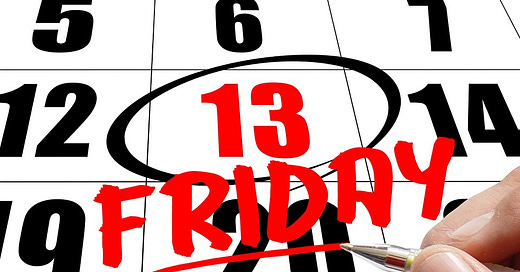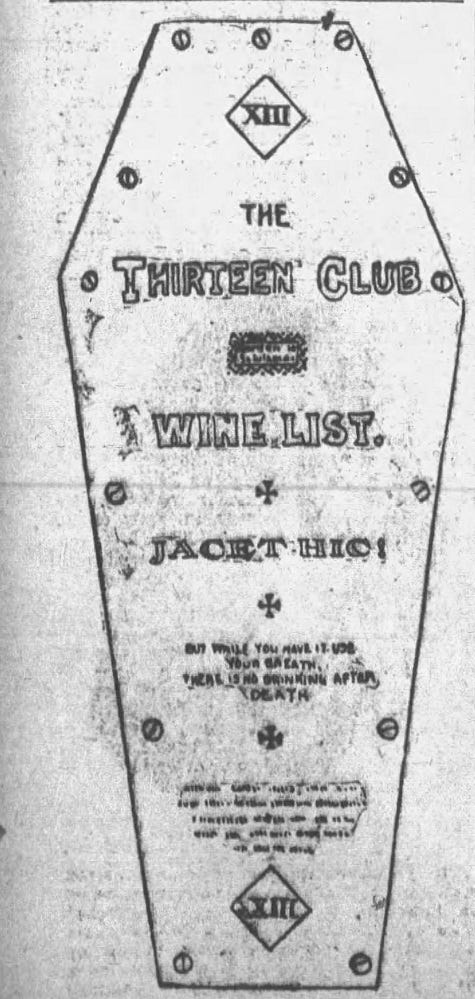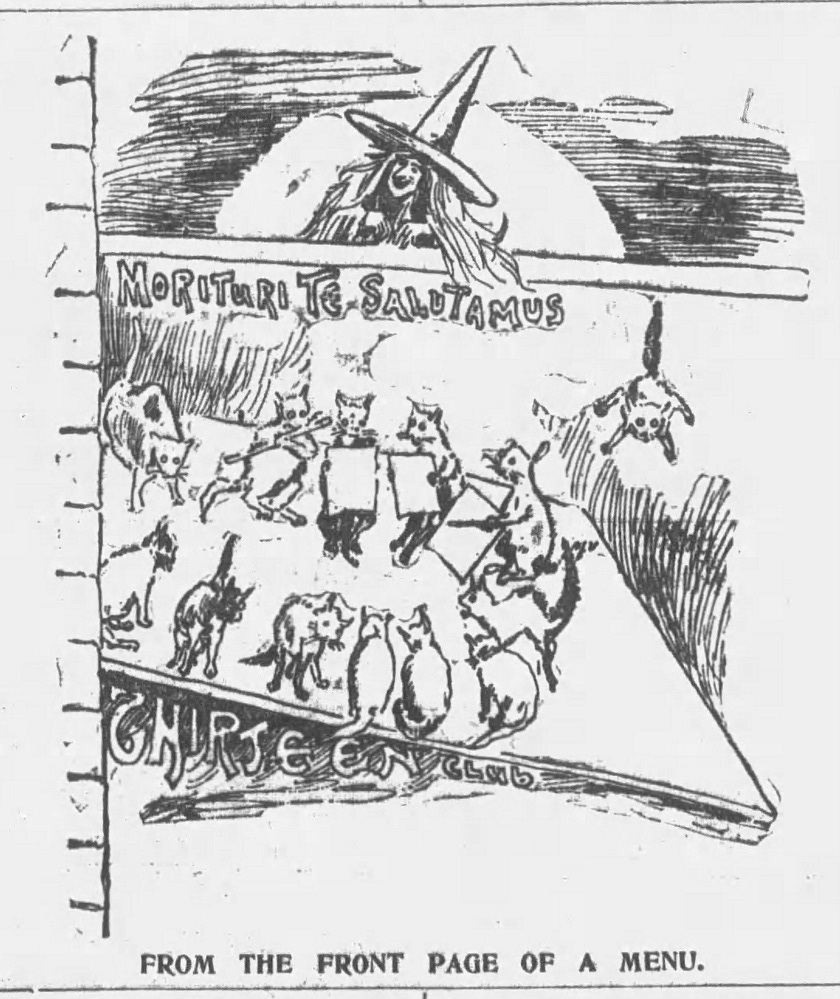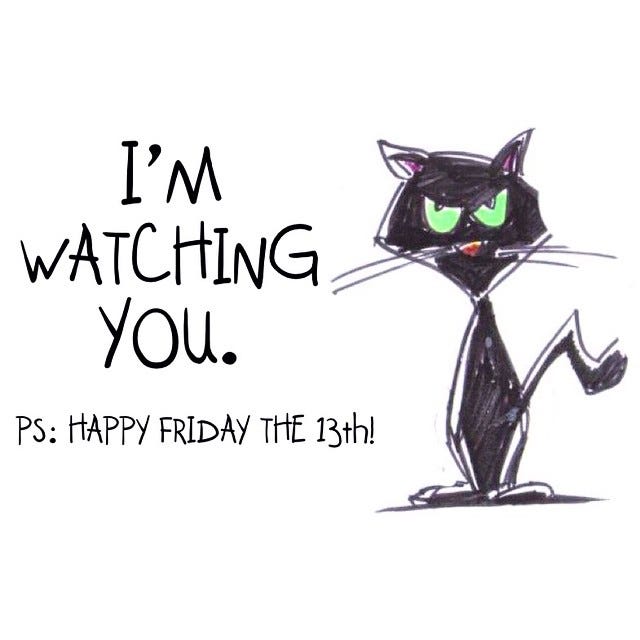How Did Friday the 13th Become Unlucky
Friday the 13th has a long history of being considered unlucky. So how did this date become associated with bad luck and highlighted on the calendars of the superstitious?
The unlucky connotation to the number 13 has been around for decades. In modern times, one only has to look to the slasher series Friday the 13th, which produced 12 films from 1980 to 2009.
One of the first to popularize for better or worse the significance of the 13th was Capt. William Festus Fowler, who claimed the number 13 played a prominent role in his life. He was the originator of the Thirteen Club.
He was the proprietor of a pub, which he leased on September 13, 1863. The Knickerbocker Cottage had been a roadside inn since 1825. This was an old-time landmark on Sixth Avenue and 27th Street, New York, which dated all the way back to the 1730s. He gave up the lease on April 13, 1883. During these years he owned a black cat named Cornelius.
He served in the Civil War, and was an architect of renown in New York, having designed several theaters on Broadway, Bellevue Hospital, The Broadway Central Hotel and other landmarks.
He was an old Freemason of high standing, and had many personal acquaintances among the powerful of New York. His name was the 13th listed on the roll of The Ancient Arabic Order of the Nobles of the Mystic Shrine. And perhaps it was this repetition of the number “13”, which prompted him to gather 13 men to sit down for a dinner, which he admitted initially was difficult, because many promised they would, but failed to show up.
They held a business meeting at 7:13 p.m., on Friday, January 13 1882. in the Knickerbocker cottage, the number of which on the avenue 4-5-4, adds up to 13, and at 8:13 p.m. they sat down to dinner in room 13. To enter the room they passed under a ladder of 13 rungs; the old American flag with 13 stars was canopied over the chairman's head, there were 13 jets of gas; the men of 13 courses was prettily printed on a pasteboard coffin lid, adorned with 13 gilt nail-heads, 13 bottles of wine decked the table; 13 gay boutonnières lay near the 13 plates.
The guests enjoyed themselves, but there was terror among the waiters who were afraid they would be doomed by the same fate of the participants. Two of the waiters fled from the house after setting the table.
The name of the original thirteen besides Capt. Fowler were: Daniel Wolff, Henry A. Heiser, Charles Sotheran, James A. Reed, Marvin R. Clark, Samuel Jones, Julius Wiskowski, Richard Fitzgerald, George P. Powell, John Mills, Edwin Dew and Lehman Israels. By 1895, only four of them had died, and the popularity of the club had increased. It attracted governors and senators, as well as prominent members of the bench, the bar, the church, the press and impresarios of commercial enterprise.
None of the members died within the year prescribed by superstition, as the allotted limit of life after dining in a party of 13. One member died 15 months after his last dinner in the club; one ex-member who never attended died, and one honorary member who never dined in the club passed away.
In the years to follow numerous Thirteen Clubs were founded around the United States, and in Europe.
Life membership cost $13, the dues of active members were 13 cents per month. The parent club was incorporated September 13, 1882, and they granted charters to other clubs for a fee of $13.13.
The members intentionally spilled salt at the table, and use the motto, "Morituri te salutamus" (to die with your greeting).
Their wine lists were printed in the shape of tombstones.
The intent of the club was to repudiate superstition.
But it wasn't only the number 13, but the owl. Captain Fowler observed in 1883, that the increase of the owl's popularity was the gathering of the Owl Club, who came to the "hollow tree roost" at the Knickerbocker Cottage at midnight.
Captain Fowler died in 1897 from apoplexy at the age of 70, long after attending may 13th Club dinners.
The superstition against 13 goes back to ancient times. According to the book Holiday Folklore, Phobias and Fun (1992), in ancient maritime tradition, no voyage could begin on a Friday because sailors believed that bad luck would fall on the ship. Lord Byron purposefully tested this superstition by sailing for Greece on a Friday, and he died in that country.
During the 1800s, the stigma against sailing on Friday the 13th was so prevalent that Lloyds of London refused to insure any ship sailing on that date.
Even among the military, if for some reason a ship was scheduled to leave port on the 13th (Friday or not), somehow it would contrive to leave after midnight.
An Old Farmer's Almanac described where the town father of French Lick Springs, Indiana decreed that all black cats in town had to wear bells on Friday the 13th.
Once upon time there were French socialites known as "quatorziens" (fourteeners), which were called upon in an emergency to add a guest for a dinner party, when it unexpectedly had only 13 attendees.
Many skyscrapers do not have a 13th floor. Hotels and hospitals avoid having a Room 13.
The Greeks and Romans regarded thirteen as a sign of destruction. In early Rome, witches gathered in groups of twelve, and the 13th member was the devil.
In Norse mythology there was a legend where 12 gods gathered for a meal, when Loki the red-haired evildoer and spirit of strife sneaked in uninvited. He tricked Hoder, the blind god of darkness to kill Balder the Beautiful, the god of joy and gladness. Upon the death of Baldur darkness fell throughout the universe and the whole earth. From then on the number 13 has been considered ominous.
The Vikings made their hangman's noose with 13 knots.
According to 15th century sorcerers, walking around your house 13 times made you safe all day on Friday the 13th by chasing evils spirits away.
Folklore from 1696, instructed that those who wanted to keep sinister beings from doing you harm on the 13th, should hang their shoes out the window.
Judas Iscariot, who would betray Christ was the 13th to arrive at the Last Supper.
The simplest solution to be safe during Friday the 13th, is to walk around the block with your mouth full of water, without swallowing it until you are finished.
However the 13th was not always seen as a portend of ill luck. Two important buildings to the nation were started on the 13th. George Washington laid the cornerstone for the White House on October 13, 1792. The cornerstone for the Supreme Court was laid on October 13, 1932.
Fear of Friday the 13th is called paraskevidekatriaphobia, which can range from nervousness to full blown panic attacks.












